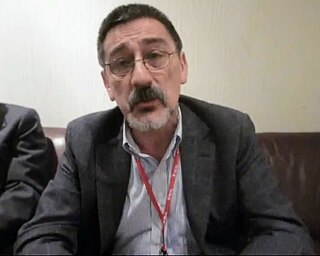
Carlos Gardel was a French-born Argentine singer, songwriter, composer and actor, and the most prominent figure in the history of tango. He was one of the most influential interpreters of world popular music in the first half of the 20th century. Gardel is the most famous popular tango singer of all time and is recognized throughout the world. He was notable for his baritone voice and the dramatic phrasing of his lyrics. Together with lyricist and long-time collaborator Alfredo Le Pera, Gardel wrote several classic tangos.

No Te Va Gustar, also known by their initials NTVG, is an Uruguayan rock band formed in 1994 in Montevideo. The group consists of Emiliano Brancciari, Guzmán Silveira (bass), Diego Bartaburu (drums), Martín Gil (trumpet), Denis Ramos (trombone), Mauricio Ortiz, Pablo Coniberti (guitar) and Francisco Nasser (keyboards).
The Pabellón de la Fama del Caribe was established in 1996 by Juan Francisco Puello Herrera, commissioner of the Confederación de Béisbol del Caribe.
The Latin Songwriters Hall of Fame (LSHOF) is an honor by its board of directors to "educate, preserve, honor and celebrate the legacy of the greatest Latin songwriters from all over the world and their music in every genre." The LSHOF recognizes songwriters from Spanish and Portuguese-speaking regions internationally. It was founded by songwriters Rudy Pérez and Desmond Child and the inaugural award ceremony began in 2013. LSHOF has members who come from Spanish- and Portuguese-speaking regions of Latin America, Europe, and the United States. In addition to inducting Latin Songwriters into the Hall of Fame, the LSHOF also awards the Premio De La Voz Musa which is given to five inductees and "other special award recipients". Winners are selected by through an online survey.

Almeria Walk of Fame is the filmmaking Walk of Fame located in Almeria, Spain, similar to Hollywood Walk of Fame.
Ana María del Carmen Ribeiro Gutiérrez, known as Ana Ribeiro, is a Uruguayan historian, writer, and professor. Her works are based on essays and novels that relate historical events of the country.
Amalia Polleri de Viana was a Uruguayan teacher, artist, poet, journalist, and art critic.

Ana Micaela Monterroso de Lavalleja was an Uruguayan woman who was the wife of Juan Antonio Lavalleja and traveled with Lavalleja and participating in the politics of the world around her. Whether or not Lavallejas was present in the household, Monterroso ran the family's affairs and would actively aid the resistance to the Portuguese and the government of Fructuoso Rivera. She and Lavalleja would have ten children, some of whom died young. She, along with Melchora Cuenca and Cayetana Leguizamón, represent the involvement of women in the early history of modern Uruguay.

Esmeralda Herminia Mallada Invernizzi is a Uruguayan astronomer and professor who, for her contributions to that scientific discipline, has been honored with the designation of her name to an asteroid.

Eloísa Ibarra is a Uruguayan visual artist who has been recognized for her graphic works.

Cecilia Vignolo is a Uruguayan visual artist, teacher, and communicator.

Gladys Elena Vergara Gavagnin was a Uruguayan astronomer and professor, known for her calculations on eclipses, made during a time when computers were not capable of them. The asteroid 5659 Vergara is named in her honor.

Liliana García Sosa is an Uruguayan-Chilean actress with a distinguished film, theatre, and television career in Chile and Uruguay. She has been an honorary cultural associate of the Uruguayan embassy in Chile since the first government of Tabaré Vázquez.

Hilda López was a Uruguayan painter and sculptor. She was best known for her abstract, gestural paintings and drawings from the 1960s, as well as for her political activism following the 1973 Uruguayan coup d'état. López's work first came to public attention in the 1960s after exhibitions in Montevideo and the United States, and she soon became an influential name in Uruguay's Informalism movement. López represented Uruguay in the São Paulo Art Biennial, and her work is part of the collection of the National Museum of Visual Arts in Uruguay.
Gloria Helena Corbellini Troche is a Uruguayan writer and professor.
Margarita Musto is a Uruguayan actress, theater director, translator, teacher, and general and artistic director of the Comedia Nacional.
The Golden Book Awards were created to honor Uruguayan and foreign best-selling books published in Uruguay. The prizes are awarded by the Uruguayan Book Chamber (CUL).

Florencio Ignacio Utreras Díaz is a Chilean mathematician who is considered to be one of the fathers of the Internet in Chile.

Cabildo Abierto is an Uruguayan political party founded in 2019. The party is described as populist, nationalist and conservative, as well as mostly characterized as far-right on the mainstream political spectre. However, it defines itself as Arteguist and is referred to as a third position party by some sources. It participated for the first time in an election the same year of its foundation, obtaining 11.04% of the votes, three senators and eleven representatives. It is led by Guido Manini Ríos, descendant of a traditional Colorado Party family and former Commander in Chief of the Army.

Miriam Doblas Muñoz, known professionally as Lola Índigo, is a Spanish singer and dancer. She rose to fame in 2017, when she participated in series nine of the Spanish reality television talent competition Operación Triunfo. She was the first participant to be eliminated from the talent show. After exiting the show, the singer signed with Universal Music and released her debut single "Ya No Quiero Ná" which turned into a smash-hit in Spain, peaking at number three on the PROMUSICAE musical chart and selling more than a hundred thousand copies. It was certified as three times platinum. Her short but intense musical career has earned her multiple awards such as an MTV Europe Music Award for Best Spanish Act in 2019.













